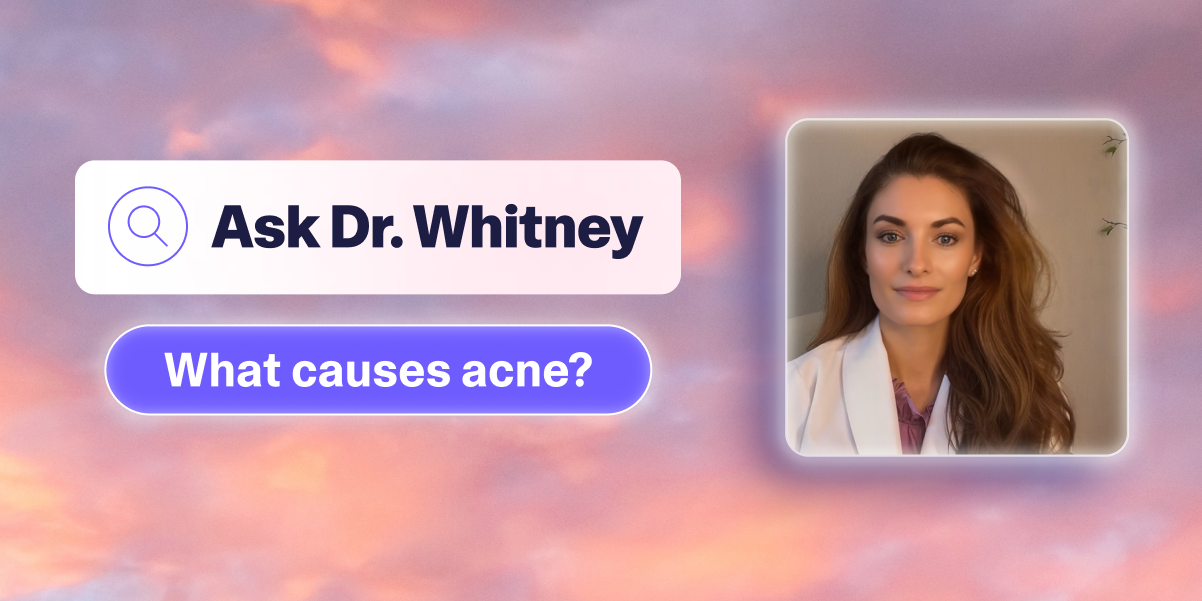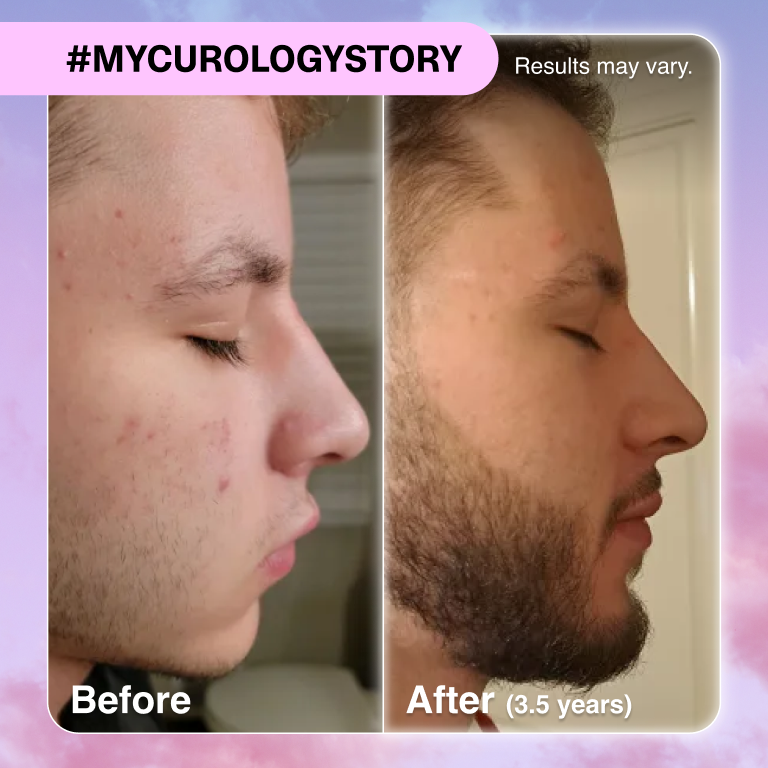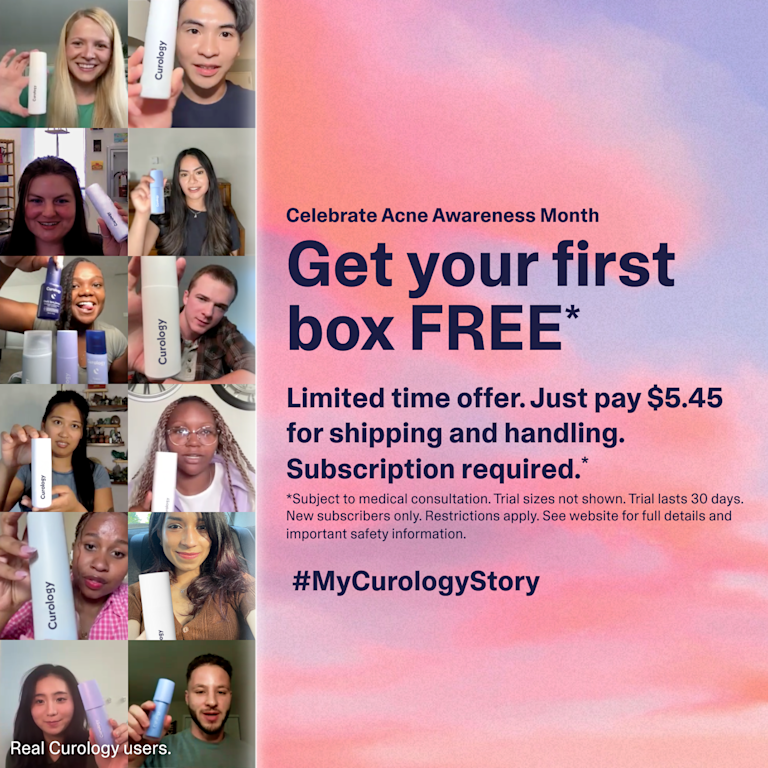How it works:
Share your skin goals and snap selfies
Your dermatology provider prescribes your formula
Apply nightly for happy, healthy skin
How it works:
How it works:
Share your skin goals and snap selfies
Your dermatology provider prescribes your formula
Apply nightly for happy, healthy skin
How it works:
Ask Dr. Whitney: What causes acne?
Dr. Whitney answers your most-asked questions each week for Acne Awareness Month.



Happy Acne Awareness Month! I’m Dr. Whitney Tolpinrud, MD, FAAD, a board-certified dermatologist and Medical Director at Curology.
This month is incredibly special to me and the entire Curology team. Although the journey to clearer skin is something to celebrate, I have witnessed firsthand how it doesn’t always feel that way. 5.5 million people have come to Curology with their unique skin struggles – yet almost all of them tell us the same story: their acne makes them feel overwhelmed, insecure, and isolated.
It’s time to change that.
Each Friday in June, I’ll be answering your most asked acne questions right here on the blog! I’ll equip you with how to understand, treat, and prevent your breakouts so that you can feel empowered on your journey to clearer, healthier skin.

This week we’ll cover how acne begins, then move into how to treat acne, post-acne marks, and finally how to prevent acne.
So let’s get into it…
What Is Acne, and Why Does It Form?
Let’s clear something up! Acne isn’t just a teenage phase or a simple skin issue.
Acne vulgaris is a chronic inflammatory condition of the pilosebaceous unit (the hair follicle and oil gland combo), and can cause permanent scarring. It can also affect people well into adulthood.
If you’ve ever wondered why breakouts seem to appear out of nowhere, you can blame the perfect storm of four factors: excess oil (sebum) production, clogged pores due to sticky skin cells, the overgrowth of Cutibacterium acnes bacteria, and inflammation.
These elements work together to form everything from blackheads and whiteheads (these are the non-inflammatory kind) to the more inflamed spots like red bumps, pus-filled pimples, and deeper nodules or cysts.
While it’s tempting to label all acne as “bacterial” (as in caused by bacteria), this is not the case. Acne wears many faces, and not every breakout behaves the same. Understanding what type of acne you have can really change how we approach treatment.

Learn more about what causes acne here.
How do you know if your acne is hormonal?
Hormones, especially androgens, play a big role by revving up oil production. That’s why acne often flares around puberty, menstrual cycles, pregnancy, or with conditions like polycystic ovarian syndrome (PCOS).
If you're noticing stubborn breakouts along the chin and jawline, hormones may be the culprit! Hormonal fluctuations such as increased androgen levels can trigger excess oil production, leading to clogged pores and contributing to breakouts. Hormonally influenced acne can be addressed with treatments such as topical or oral spironolactone. Other treatments that directly target hormones include certain oral contraceptives. However, acne is multifactorial, and even though hormones may be playing a part, other factors may be at play. So, more traditional acne treatments that do not affect hormones, such as topical tretinoin, can still help treat hormonal acne.
How do you know if your acne is fungal?
You may often hear the term “fungal acne,” which is due to Pityrosporum (aka malassezia), a type of fungus that is normally present on our skin. Increased humidity and sweat can trigger the growth of Pityrosporum in the pores, which can contribute to breakouts.
Zinc pyrithione, an ingredient offered in our personalized prescription formulas at Curology, can help both “fungal acne” and acne made worse by Pityrosporum.
You can learn more about the different types of acne here.
What are the most common lifestyle acne triggers?
As we’ve covered, acne can be influenced by factors like genetics and hormones. However, there are many triggers more directly within your control. The most common lifestyle triggers I see include:
Stress
Diet
Skincare products
Certain medications
Some patients may notice acne breakouts pop up leading up to big events or important tests when they might be stressed. Although stress doesn’t directly cause acne, it can trigger breakouts due to hormones that stimulate the oil glands. Stress management is not only good for your body but also good for your skin!
For some people, certain foods (e.g. simple sugars and carbohydrates) can trigger acne and increased oil production. You can read more about potential dietary triggers here.
Acne cosmetica is a type of acne that is induced by the use of cosmetic products. It is characterized by the development of comedones, papules, and pustules, primarily on the face, in areas where cosmetics are applied. This condition is typically associated with the use of occlusive or comedogenic cosmetic products that block the pores. It can be very helpful to avoid using products that contain pore-clogging ingredients such as coconut oil and isopropyl myristate. These ingredients can contribute to the development of acne. You can review your products for potentially pore-clogging ingredients here.
Certain medications may also contribute to acne breakouts. However, medications can be essential for patients to continue to use, despite acne breakouts. These breakouts can typically be addressed with standard acne treatments without discontinuing the medication.
Read on to find out how Curology can help!
If you have acne, where do you start?
Acne is incredibly common, and whether your skin is dealing with the occasional breakout or something more persistent, the good news is you don’t have to navigate this alone.
We have effective acne treatments at Curology. As a dermatologist, I understand how deeply acne can affect confidence, and we’re here to help you feel more comfortable in your own skin.
If you��’re in need of expert support in figuring out what type of acne you have, you can take our skin quiz! If you decide to start Curology, our licensed dermatology providers can answer any question, any time.
All month long, we’re sharing some of the real skin stories of the 5.5 million Curology patients we’ve served. You can read more about #MyCurologyStory here. My biggest hope is that this education will empower you to transform your skin, then we’ll be celebrating your #MyCurologyStory too!


Dr. Whitney Tolpinrud